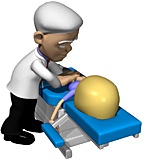
Unsubscribe
Update e-mail address
August 22, 2006 [Volume 7, Issue 18]
To Your Health is brought to you by:
In this issue of To Your Health:
- Chiropractic: Not Just for Back Pain
- Ginger: Multiple Health Benefits
- A Little Sun a Day Keeps Vitamin D Deficiency Away
Chiropractic: Not Just for Back Pain
 Chest pain, known medically as angina, affects over 6 million Americans every year. These frightening attacks can be brought on by physical overexertion or stress. In a study performed in Denmark, positive results were shown in patients with stable angina after a four-week session of chiropractic adjustments.
Chest pain, known medically as angina, affects over 6 million Americans every year. These frightening attacks can be brought on by physical overexertion or stress. In a study performed in Denmark, positive results were shown in patients with stable angina after a four-week session of chiropractic adjustments.
Fifty of the 275 participants were diagnosed with cervicothoracic angina (CTA - chest pain originating from the spine and thorax) and placed into the treatment group. The remaining 225 patients who were CTA-negative made up the control group. Participants filled out a questionnaire that recorded their level of pain and overall quality of life. Members of the control group also filled out the questionnaire, but were not offered chiropractic care.
The same chiropractor provided eight treatments to each patient over a four-week period, accompanied by trigger-point therapy, manual pressure and deep stroking massage. After the final treatments, the same questionnaire was given to the patients.
Approximately 75 percent of the participants in the treatment group reported an improvement, compared to only approximately 25 percent in the control group. The researchers still feel more studies need to be performed on this subject.
While these findings are preliminary, they definitely support continuing research suggesting chiropractic can benefit more than just low back pain. To find out more about the benefits of chiropractic, talk to a DC in your area. Having trouble finding the right chiropractor for you? Use our ChiroLocator at www.chiroweb.com/locator.
Christensen H, Vach W, Gichangi A, et al. Manual therapy for patients with stable angina pectoris: a nonrandomized open prospective trial. Journal of Manipulative and Physiological Theraputics, November 2005;28(9):654-661.
Ginger: Multiple Health Benefits
 Already used as a pain reliever for arthritis and migraines, and an effective remedy for nausea, ginger is ready to battle even more health foes. Researchers from the University of Michigan Comprehensive Cancer Center believe ginger not only kills cancer cells, but also prevents them from becoming resilient to chemotherapy.
Already used as a pain reliever for arthritis and migraines, and an effective remedy for nausea, ginger is ready to battle even more health foes. Researchers from the University of Michigan Comprehensive Cancer Center believe ginger not only kills cancer cells, but also prevents them from becoming resilient to chemotherapy.
Scientists combined a solution of ginger powder and water with ovarian cancer cells; in every one of their tests, the cancer cells died from being in contact with the ginger. The cancer cells either committed "suicide" (apoptosis) or attacked themselves.
With the number of American women to be diagnosed with ovarian cancer close to 20,000 this year, a common root like ginger has found itself back in the scientific spotlight. Researchers are pushing for further studies of its attributes. Other advantages to the use of ginger are that it's already available in a pill and there are hardly any reports of side effects.
Would you like to learn more about the benefits of adding ginger to your daily diet? Head on over to www.chiroweb.com/tyh/ginger.html to find out more about this 4,000-year-old root.
Nordqvist, Christian. "Ginger Kills Ovarian Cancer Cells." MedicalNewsToday.com, April 17, 2006.
A Little Sun a Day Keeps Vitamin D Deficiency Away
Sunshine, aside from being good for your soul, adds a very important element into your life - vitamin D. The sun works with the skin to produce vitamin D in your body. Although other forms of vitamin D are in some of the foods we eat, they still need to be processed to gain the benefits.
A study published in the Archives of Disease in Childhood evaluated a group of adolescent girls in an inner city school in the United Kingdom for vitamin D deficiency. Fifty-one girls between the ages of 14 and 16 were chosen to participate in the study. After measuring weight, height and body mass, the researchers distributed a questionnaire that evaluated the girls' daily intake of vitamin D, calcium and sunlight.
Thirty-seven of the girls (73 percent) were found to be vitamin D deficient, while nine (17 percent) of the students were considered severely deficient. The results indicated that the vitamin D deficiency was due to underexposure to sunlight.
Of course, too much sun can be a bad thing, particularly in terms of skin damage, so be careful. But a little a day can go a long way toward ensuring adequate intake of vitamin D. To finds out more about the importance of vitamin D and other vitamins/minerals in your daily diet, visit www.chiroweb.com/find/tellmeabout/vitamind.html.
Das G, Crocombe S, McGrath M, et al. Hypovitaminosis D among healthy adolescent girls attending an inner city school. Archives of Disease in Childhood, July 2006;91(7):569-572.
Unsubscribe
Thank you for subscribing to To Your Health. If you have received this
newsletter in error or wish to unsubscribe, you may remove your name from
our e-mail subscription list at www.chiroweb.com/newsletter/TYH/unsubscribe.php.
Update your e-mail address
To update the e-mail address your newsletter is sent to, click here.
If you have any questions regarding your subscription, please complete this form at www.chiroweb.com/newsletterhelp/TYH.
